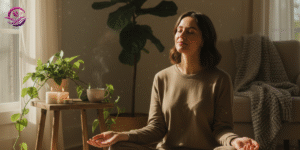Anxiety attacks, also called panic attacks, can feel sudden and overwhelming, bringing symptoms like a racing heart, shortness of breath, chest tightness, or fear of losing control. While long-term support from a professional is essential, knowing the best ways to calm an anxiety attack naturally can help you manage intense moments and regain a sense of peace right away.
In this blog, we’ll explore effective and natural techniques you can use in the moment to regain control and reduce symptoms.
1- Practice Deep Breathing – One of the Best Ways to Calm an Anxiety Attack
One of the most powerful ways to ground yourself during an anxiety attack is controlled breathing.
- How to do it:
Try the 4-7-8 technique: Inhale through your nose for 4 seconds, hold your breath for 7 seconds, and exhale slowly through your mouth for 8 seconds. - Why it works:
Deep breathing activates your parasympathetic nervous system, helping your body shift from panic mode to relaxation mode.
2. Use Grounding Techniques (5-4-3-2-1)
Grounding helps you bring your focus away from anxiety and back to the present moment.
- The 5-4-3-2-1 method:
- 5 things you can see
- 4 things you can touch
- 3 things you can hear
- 2 things you can smell
- 1 thing you can taste
- Why it works:
Engaging your senses helps disrupt the cycle of anxious thoughts and reorients your mind to your environment.
3. Get Moving
Physical activity can be a quick and effective way to release nervous energy and tension.
- Examples:
Take a brisk walk, stretch, do jumping jacks, or shake out your hands and arms. - Why it works:
Movement helps your body burn off adrenaline and promotes the release of feel-good endorphins.
4. Try Cold Water or Ice
Cooling your body can interrupt anxiety signals and help you reset.
- What to do:
Splash cold water on your face or hold an ice cube in your hand for a few moments. - Why it works:
Cold exposure triggers the “dive reflex,” which slows your heart rate and calms your nervous system.
5. Repeat Calming Phrases or Affirmations
Affirmations help counter negative thoughts with soothing, reassuring statements.
- Examples:
- “This feeling is temporary.”
- “I am safe right now.”
- “I have survived this before, I can do it again.”
- Why it works:
Positive self-talk helps shift your mindset and provides mental reassurance in the middle of panic.
6. Focus on a Single Object
Find something around you to focus on, a pen, a plant, a piece of art, and examine it closely.
- What to do:
Notice its color, texture, shape, and details. - Why it works:
This acts as a visual anchor, grounding your thoughts and attention away from spiraling anxiety.
7. Use Aromatherapy
Certain essential oils can have calming effects on the brain.
- Best oils for anxiety:
- Lavender
- Chamomile
- Bergamot
- Frankincense
- How to use:
Inhale the scent directly, diffuse it in the room, or apply a diluted version to your wrists.
8. Journal or Write It Out
Getting your thoughts on paper can help you process what you’re feeling.
- What to write:
- What triggered the anxiety?
- What are you feeling physically and emotionally?
- What would help you feel better?
- Why it works:
Journaling provides an outlet for expression and helps you identify patterns over time.
When to Seek Professional Help
While these techniques can provide natural relief, frequent or severe anxiety attacks should not be ignored. If your symptoms are persistent, it’s important to speak with a licensed mental health provider. Therapy, medication, or a combination of both may be recommended for long-term management.
Final Thoughts
Anxiety attacks are scary, but you are not powerless. Using natural methods like deep breathing, grounding exercises, movement, and calming thoughts can help bring you back to the present and soothe your body and mind. Over time, with practice and support, you can build resilience and confidence in managing anxiety.
Need professional support for anxiety?
Our experienced mental health team is here to help. Book an appointment today and take the first step toward healing.
According to a study by Harvard Health Publishing, consistent breathing techniques and mindfulness can reduce anxiety symptoms over time.










